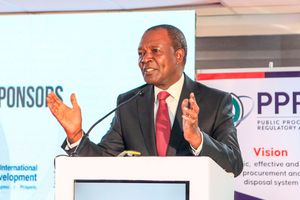
Most government officers on official travel within and outside Kenya will be expected to use economy class for travel.
The Treasury is set to limit business class foreign air travel to Cabinet Secretaries and Principal Secretaries in a policy set to cut expenditures on travel within the public service.
The move is aimed at ensuring the use of air transport is compliant with the existing austerity measures that seek to greatly reduce the government’s budget on domestic and foreign travel.
“Foreign travel via business class shall be restricted to Cabinet Secretaries and Principal Secretaries only. The use of the business class is restricted to only senior government officers of JG R (job groups) and above,” notes the National Treasury draft government transport policy.
All other government officers on official travel within and outside Kenya shall use economy class for travel while hired air transport services shall only be used within the country under exceptional circumstances.
Preference for air transport shall be given to national carrier Kenya Airways (KQ) in the policy that moves away from the past practice of dishing out circulars to the heads of ministries, State departments, and chief executives of corporations.
The exchequer has highlighted challenges associated with executing circulars, including the lack of implementation of some of the reform measures recommended in 2006 and subsequent circulars.
In December, the Treasury chopped allowances for official travel in half while limiting the category of officers allowed to use planes on domestic routes.
Previously in June 2023, the government issued a circular with various guidelines on foreign travel, including conditions for travel, delegation sizes, application procedures, and timelines.
The guidelines touched on foreign travel clearance for cabinet secretaries, chief administrative secretaries, principal secretaries, chairpersons, and chief executives of State corporations.
The expenditure on transport has consistently registered an increasing trend according to the Treasury, rising from Sh16.1 billion in the 2013/14 financial year to Sh17.7 billion in the 2016/17 fiscal cycle.
In the financial year ended June 2024, ministries, State departments, and agencies (MDAs) spent Sh27.3 billion on travel, comprising Sh18.15 billion for domestic and Sh9.19 billion for foreign travel respectively according to data from the Controller of Budget (CoB).
The CoB noted that foreign travel should focus on essential trips aligned with essential State obligations.
Foreign travel applications and approvals for public servants are expected to be processed through the Foreign Travel Information Management System (Fotmis) to ensure accountability and prudent resource use.
Official travel by public servants includes any travel by a public official or any other person where a public-sector organisation or service uses public monies to pay for the travel by land, air, or sea.
Currently, non-essential foreign travel remains suspended with the Ministry of Foreign and Diaspora Affairs being tasked with assessing the necessity of participation of a delegation in a destination that has onsite foreign service staff.
Senior public officers are also expected to only attend policy-related meetings and be out of the country for no more than seven working days excluding the travel day.
Cumulative days away should not exceed seven days per travel, 15 days every three months, or 45 days a year.
Public officers are meanwhile barred from attending internationally hosted training, meetings, conferences, and events organised by local and regional-based public or private institutions.









